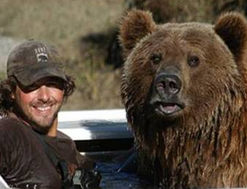Books & arts
文艺板块
Book review
书评
Interspecies relations
种间关系
Creature discomforts
动物的烦恼
How to Love Animals. By Henry Mance.
《如何爱动物》。作者:亨利·曼斯
Cat videos are the definition of clickbait, dogs are prized for their companionable qualities, and the most popular cartoons feature bears, rabbits, ducks and pigs. But in an age when so many people profess to be animal-lovers, a remarkable number behave in ways that suggest the opposite — eating meat of dubious provenance or fish that suffocated on the decks of trawlers, controlling pets with chastening strictness and gawping at wretchedly constrained elephants in zoos.
猫咪视频是吸睛利器,狗狗因友善的品质而备受青睐,熊、兔子、鸭子和猪往往是大火卡通片的主角。在当今时代,许多人都自诩爱动物人士,但还是有相当一部分人的举止截然相反,他们会吃来源可疑的肉或在拖网渔船甲板上窒息的鱼,会严厉管教动物,还会去动物园里观赏可怜受困的大象。
 download.jpg
As Henry Mance, a British journalist, observes, “animals have worse prospects in the very time that we have supposedly been looking out for them.” His lively first book argues for a profound reassessment of humans’ relationships with other species. It is a polemic framed as a personal quest. He takes a job at a slaughterhouse and graphically reports his efforts to rip the wool off freshly killed sheep. He learns to fish, goes on a fruitless deer hunt and visits a lab where drugs are tested on mice and frogs. He observes at close quarters the effects of both deforestation and re-wilding; he attends a Californian dog-fanciers’ convention where corgis are dressed as sharks while their owners dress as corgis.
英国记者亨利·曼斯观察到,“我们自认是在为动物着想,却让它们的前景更加糟糕。”曼斯的第一本书生动明快,主张重新深入考虑人类与其他物种的关系。这是一本以个人探索为论辩框架的书。曼斯在一家屠宰场找到了一份工作,并生动地报道了自己从刚杀掉的羊身上扯下羊毛的经历。他学会了钓鱼,进行了一次无果的猎鹿活动,还参观了一间用老鼠和青蛙进行药物测试的实验室。他近距离观察到森林砍伐和再荒野化的影响;他参加了加州的一个爱狗者大会,在大会上,柯吉犬被打扮成鲨鱼,而主人们则打扮成柯吉犬。
Some of Mr Mance’s conclusions are unsurprising. Covid-19 has been a sharp education in the cost of disrupting ecosystems. Animals widely regarded as expendable, such as wolves, turn out to play vital roles in keeping other species in check. Though as a child the author adored zoos, marvelling at the tigers and pandas, he now has misgivings about these “soulless, motionless” places, which strike him as “the conservation equivalent of a police line-up”. He is an advocate of veganism, but worries that it may be a “niche pursuit” and “a sign of society fragmenting, rather than animal interests winning”.
download.jpg
As Henry Mance, a British journalist, observes, “animals have worse prospects in the very time that we have supposedly been looking out for them.” His lively first book argues for a profound reassessment of humans’ relationships with other species. It is a polemic framed as a personal quest. He takes a job at a slaughterhouse and graphically reports his efforts to rip the wool off freshly killed sheep. He learns to fish, goes on a fruitless deer hunt and visits a lab where drugs are tested on mice and frogs. He observes at close quarters the effects of both deforestation and re-wilding; he attends a Californian dog-fanciers’ convention where corgis are dressed as sharks while their owners dress as corgis.
英国记者亨利·曼斯观察到,“我们自认是在为动物着想,却让它们的前景更加糟糕。”曼斯的第一本书生动明快,主张重新深入考虑人类与其他物种的关系。这是一本以个人探索为论辩框架的书。曼斯在一家屠宰场找到了一份工作,并生动地报道了自己从刚杀掉的羊身上扯下羊毛的经历。他学会了钓鱼,进行了一次无果的猎鹿活动,还参观了一间用老鼠和青蛙进行药物测试的实验室。他近距离观察到森林砍伐和再荒野化的影响;他参加了加州的一个爱狗者大会,在大会上,柯吉犬被打扮成鲨鱼,而主人们则打扮成柯吉犬。
Some of Mr Mance’s conclusions are unsurprising. Covid-19 has been a sharp education in the cost of disrupting ecosystems. Animals widely regarded as expendable, such as wolves, turn out to play vital roles in keeping other species in check. Though as a child the author adored zoos, marvelling at the tigers and pandas, he now has misgivings about these “soulless, motionless” places, which strike him as “the conservation equivalent of a police line-up”. He is an advocate of veganism, but worries that it may be a “niche pursuit” and “a sign of society fragmenting, rather than animal interests winning”.
曼斯得出的某些结论并不出人意料。新冠疫情已然成为尖锐的教训,是人类破坏生态系统的代价。某些人们广泛认为可杀掉的动物在控制其他物种方面却起着至关重要的作用,比如狼。尽管曼斯小时候很喜欢动物园,每每惊叹于老虎和大熊猫,但现在的他对这些“没有生气、一动不动”的地方心存疑虑,他觉得“这样的保护与警察列队没什么两样”。他是素食主义的倡导者,但担心这可能会成为“小众的追求”,变成“社会分裂的标志,却没能让动物利益取胜”。
Yet elsewhere the arguments in “How to Love Animals” are arresting. After pondering which sea creatures feel pain, Mr Mance rules that mussels, clams and oysters can be eaten in good conscience. He argues that cows raised for beef have better lives overall than those on dairy farms. It is usual to condemn trophy-hunters who cross continents to shoot lions, but “if anyone wants to stop wasteful killing for pleasure, they should focus on farming.”
但《如何爱动物》中的其他论点却很有吸引力。在仔细琢磨了会感到痛苦的海洋生物类别之后,曼斯先生规定,人们可以问心无愧地食用贻贝、蛤蜊和牡蛎。他还认为,肉用牛的生活总体上要比奶牛场的奶牛过得更好。人们通常会谴责那些跨越大洲猎杀狮子且战绩显赫的狩猎者,但“如果有人想要阻止这种以享乐为目的的浪费性猎杀,那他们应该着重关注畜牧业。”
As Mr Mance travels from the fishing ports of northern Spain to a Polish hunting lodge, he encounters plenty of strange ideas. Some activists believe seats in parliament should be reserved for people representing the interests of domesticated animals. Others recommend editing wild species’ genes so that they no longer harm other creatures with which they share habitats. There is apparently a case for letting captive elephants communicate with their counterparts in other zoos, through a device nicknamed the “Elephone”.
当曼斯从西班牙北部的渔港前往波兰的一个狩猎小屋时,他见识到了很多奇怪的想法。一些活动人士认为,议会席位理应留给那些为家畜争取利益的人。其他活动人士则建议对野生物种进行基因编辑,从而让它们不再伤害共享栖息地的其他生物。显然,让圈养的大象通过一种名为“Elephone”的设备与其他动物园的同类进行交流的想法也显得合情合理了。
No shortage of evangelists insist that technology will improve the lives of animals. Mr Mance is sceptical, concluding that restraint will achieve more than ingenuity. Even if his best line is borrowed from Martin Luther King —“The arc of the moral universe is long, but it bends toward justice”—he is a skilful writer who never shies away from painful stories, and leavens even the grimmest episodes with humour. He also has a rare ability to couch strenuous ethical arguments in terms that are warmly familiar.
不乏有传道士坚持认为科技将改善动物的生活。但曼斯先生对此持怀疑态度,他断定,约束所带来的成就将超越独创力。纵然他书中最好的一段文字是借用的马丁·路德·金的名言——“人类的道德弧线虽然很长,但是它是最终是通向平等的”——但他还是一名娴熟的作家,他从不回避痛苦的故事,即使是最阴暗的情节也会被他写出幽默感。他还拥有一种罕见的能力,能够用大家亲切熟悉的术语来阐述激烈的道德论题。
来源:经济学人

参与评论